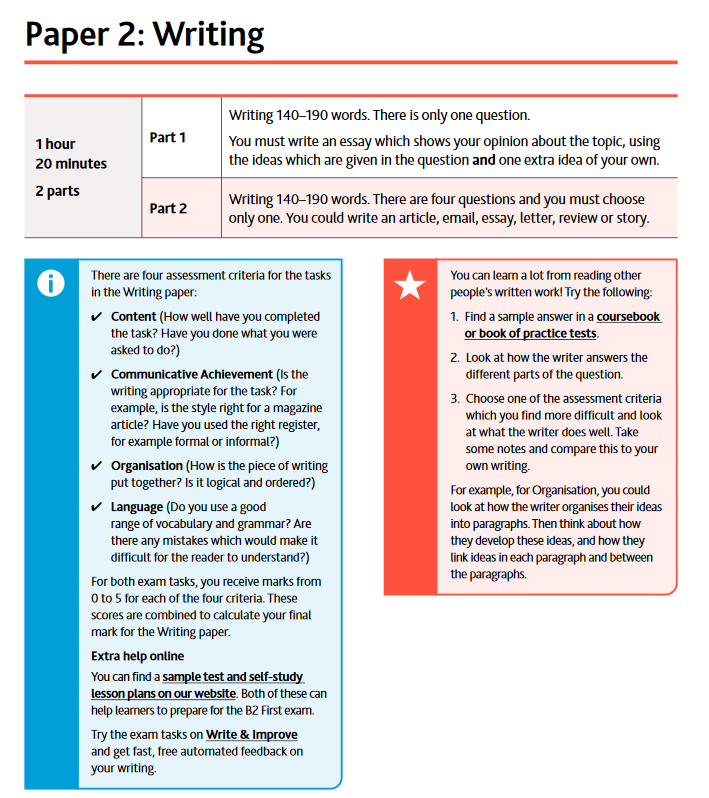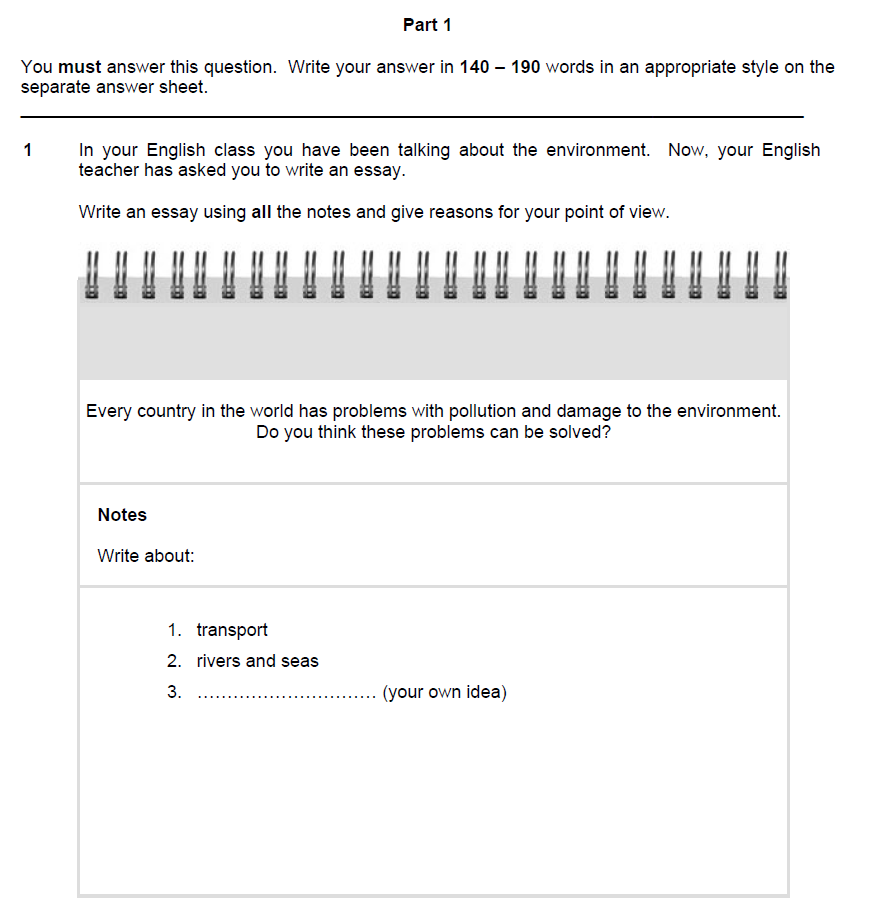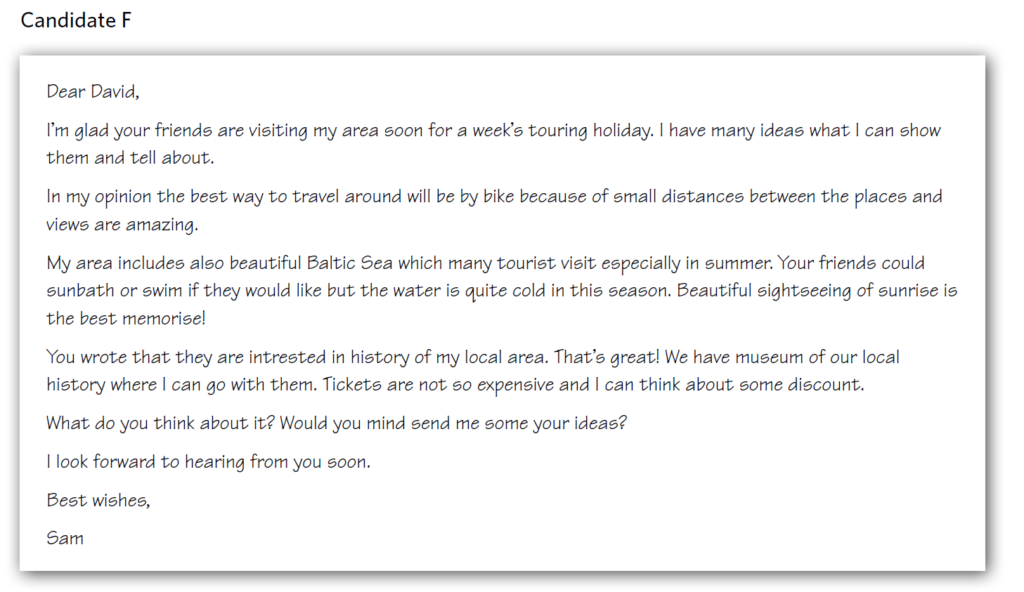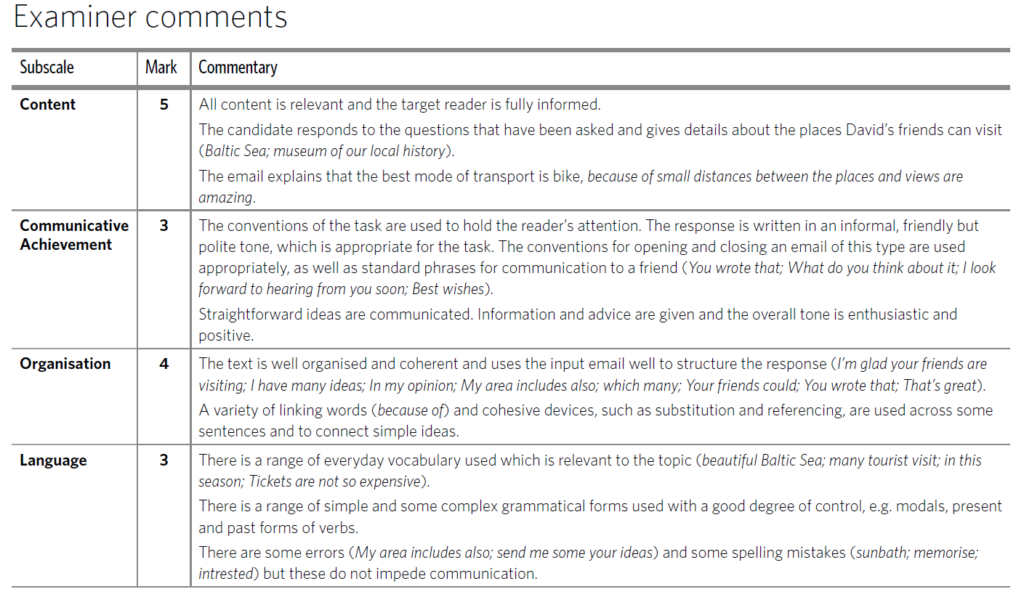-
FCE- Introduction
-
First (FCE) Exam: General OverviewLecture1.1
-
Computer Based Exam TutorialLecture1.2
-
The Cambridge English Scale: ResultsLecture1.3
-
FCE Score: How to calculateLecture1.4
-
Preparing for the exam: What should you know?Lecture1.5
-
-
Paper 1- Reading and Use of English
-
Introduction to the Reading and Use of English section of the FCE examLecture2.1
-
Developing reading skills: skimming, scanning, and reading for detailLecture2.2
-
General Information and Tips- Reading and Use of English- Paper 1Lecture2.3
-
Tips: Part 7- Multiple Matching- Reading and Use of EnglishLecture2.4
-
Practice Part 7-Multiple Matching- Reading and Use of EnglishLecture2.5
-
Tips Part 4-Key Word Transformation- Reading and Use of EnglishLecture2.6
-
More Tips Part 4- Key Word Transformation- Reading and Use of EnglishLecture2.7
-
Practice Part 4- Key Word Transformations- Reading and Use of EnglishLecture2.8
-
Tips Part 6- Gapped Text- Reading and Use of EnglishLecture2.9
-
Practice Part 6- Gapped Text- Reading and Use of EnglishLecture2.10
-
Tips Part 3-Word Formation- Reading and Use of EnglishLecture2.11
-
Practice Part 3- Word Formation-Reading and Use of EnglishLecture2.12
-
Tips Part 5- Multiple Choice- Reading and Use of EnglishLecture2.13
-
Practice Part 5- Multiple Choice- Reading and Use of English-Lecture2.14
-
Tips Part 1- Multiple Choice Cloze- Reading and Use of EnglishLecture2.15
-
More Tips Part 1- Multiple Choice Cloze- Reading and Use of EnglishLecture2.16
-
Practice Part 1- Multiple Choice Cloze- Reading and Use of English-Lecture2.17
-
Tips Part 2- Open Cloze- Reading and Use of EnglishLecture2.18
-
More Tips Part 2- Open Cloze- Reading and Use of EnglishLecture2.19
-
Practice Part 2- Open Cloze- Reading and Use of EnglishLecture2.20
-
General Overview and Tips- Reading and Use of EnglishLecture2.21
-
General Review- Reading and Use of EnglishLecture2.22
-
Paper 1 Practice- Reading and Use of EnglishLecture2.23
-
More Tips and Practice- Part 1- Multiple Choice Cloze-Reading and Use of EnglishLecture2.24
-
More Practice- Part 1- Multiple Choice Cloze- Reading and Use of EnglishLecture2.25
-
More Practice- Part 1- Multiple Choice Cloze- Reading and Use of EnglishLecture2.26
-
More Practice- Part 1- Multiple Choice Cloze- Reading and Use of EnglishLecture2.27
-
More Tips and Practice- Part 2- Open Cloze- Reading and Use of EnglishLecture2.28
-
More Tips and Practice- Part 3- Word Formation- Reading and Use of EnglishLecture2.29
-
More Tips and Practice- Part 4-Key Word Transformation-Reading and Use of EnglishLecture2.30
-
More Practice- Part 4- Key Word Transformation- Reading and Use of EnglishLecture2.31
-
More Practice- Part 4- Key Word Transformation- Reading and Use of EnglishLecture2.32
-
More Practice- Part 4- Key Word Transformation- Reading and Use of EnglishLecture2.33
-
More Tips and Practice- Part 5- Multiple Choice- Reading and Use of EnglishLecture2.34
-
More Practice- Part 5- Multiple Choice- Reading and Use of EnglishLecture2.35
-
More Tips and Practice- Part 6- Gapped Text- Reading and Use of EnglishLecture2.36
-
More Practice- Part 6- Gapped Text- Reading and Use of EnglishLecture2.37
-
More Tips and Practice- Part 7- Multiple Matching- Reading and Use of EnglishLecture2.38
-
Protegido: Sample Paper Test- Reading and Use of English 01 hour 15 minLecture2.39
-
-
Grammar
-
Dynamic vs Stative Verbs- MN Video- Listening- Grammar FocusLecture3.1
-
Dynamic vs Stative Verbs – Quiz – Practice Focus 10 questionsQuiz3.1
-
Verb + Gerund- Reading and Writing- Grammar FocusLecture3.2
-
Verb + Infinitive- Reading and Writing- Grammar FocusLecture3.3
-
Verb + Gerund/Infinitive- Reading and Writing- Grammar FocusLecture3.4
-
Verb + Gerund/Infinitive- Reading and Writing- Grammar FocusLecture3.5
-
The Use of Articles (a/an/the)- Reading and Writing- Grammar FocusLecture3.6
-
-
Vocabulary
-
Vocabulary development and strategies for word formation and collocationsLecture4.1
-
Vocabulary- Learning TipsLecture4.2
-
Collocations- Part 1Lecture4.3
-
Collocations- Part 2Lecture4.4
-
Collocations- Part 3Lecture4.5
-
Collocations- Part 4Lecture4.6
-
Collocations- Part 5Lecture4.7
-
Prefixes and Suffixes- Part 1Lecture4.8
-
Word Formation -“-ed” vs “-ing”Lecture4.9
-
Phrasal Verbs (1): meanings and typesLecture4.10
-
Phrasal Verbs (2): SeparabilityLecture4.11
-
-
Paper 2- Writing
-
Writing- Preparing for the examLecture5.1
-
Writing- Some Common QuestionsLecture5.2
-
Writing- Dos and Don’tsLecture5.3
-
Writing- How is FCE Writing Scored?Lecture5.4
-
Informal Letter/Email- Writing GuideLecture5.5
-
Informal Email/Letter- Sample and TipsLecture5.6
-
Informal Letter or Email-Tips/Sample questions and answersLecture5.7
-
Informal Email/Letter- Sample and PracticeLecture5.8
-
Formal Email/Letter – Steps to WritingLecture5.9
-
Letter of Application- Writing GuideLecture5.10
-
Letter of Application- Understanding and ModelLecture5.11
-
Letter of Application- Sample and PracticeLecture5.12
-
Letter of Application-Writing Topics- PracticeLecture5.13
-
Formal and Semi-formal Letter/ Email- Tips and SamplesLecture5.14
-
Email/Letter General Writing GuideLecture5.15
-
Article- Steps to WritingLecture5.16
-
Article- Writing Guide,Tips and Sample Questions and AnswersLecture5.17
-
Article- How to Write an Article- VideoLecture5.18
-
Article- Writing Topics- PracticeLecture5.19
-
Essay- Writing GuideLecture5.20
-
Writing Essays for the FCE- Types and OrganizationLecture5.21
-
Essay- Writing Guide, Tips and Sample Questions and AnswersLecture5.22
-
Essay- Tips and SamplesLecture5.23
-
Essay- Samples,Tips, and PracticeLecture5.24
-
Review- Writing Guide, Tips, and Sample Questions and AnswersLecture5.25
-
Review- Steps to Writing and TipsLecture5.26
-
Review- Tips and SampleLecture5.27
-
Review- Tips and SampleLecture5.28
-
Review- Sample Questions- PracticeLecture5.29
-
Report- First Steps to Writing a ReportLecture5.30
-
Report- Writing GuideLecture5.31
-
Report- Writing Sample Questions-PracticeLecture5.32
-
Writing-10 B2 First Writing Exam TipsLecture5.33
-
Writing- B2 First Writing ChecklistLecture5.34
-
Protegido: Writing- B2 First Writing Sample Paper Test Parts 1 and 2 01 hour 20 minLecture5.35
-
Writing Essays- 5 most common mistakesLecture5.36
-
-
Paper 3- Listening
-
FCE Listening- Introduction and General TipsLecture6.1
-
FCE Listening- Do’s and Dont’sLecture6.2
-
FCE Listening Tips- Part 1- Multiple ChoiceLecture6.3
-
Listening Practice- Part 1- Multiple ChoiceLecture6.4
-
Listening Practice- Part 1- Multiple ChoiceLecture6.5
-
Listening Practice- Part 1- Multiple ChoiceLecture6.6
-
FCE Listening Tips- Part 2- Sentence CompletionLecture6.7
-
Listening Practice- Part 2- Sentence CompletionLecture6.8
-
Listening Practice- Part 2- Sentence CompletionLecture6.9
-
Listening Practice- Part 2- Sentence CompletionLecture6.10
-
FCE Listening Tips- Part 3- Multiple MatchingLecture6.11
-
Listening Practice- Part 3- Multiple MatchingLecture6.12
-
Listening Practice- Part 3- Multiple MatchingLecture6.13
-
Listening Practice- Part 3- Multiple MatchingLecture6.14
-
Listening Practice- Part 3- Multiple MatchingLecture6.15
-
FCE Listening Tips- Part 4- Multiple ChoiceLecture6.16
-
Listening Practice- Part 4- Multiple ChoiceLecture6.17
-
Listening Practice- Part 4- Multiple ChoiceLecture6.18
-
Listening Practice- Part 4- Multiple ChoiceLecture6.19
-
Protegido: Listening- Sample Paper Test 1Lecture6.20
-
Protegido: Listening- Sample Paper Test 2Lecture6.21
-
-
Paper 4- Speaking
-
Varieties of EnglishLecture7.1
-
Speaking- Preparing for the examLecture7.2
-
Speaking- Some More TipsLecture7.3
-
Speaking- Some Common QuestionsLecture7.4
-
Speaking- Do’s and Don’tsLecture7.5
-
Speaking- Examiners CommentsLecture7.6
-
Speaking- Exam AssessmentLecture7.7
-
Speaking Part 2- Exam Tips and PracticeLecture7.8
-
Speaking Part 2- PracticeLecture7.9
-
Speaking Part 2- PracticeLecture7.10
-
Speaking Part 3- Exam Tips and PracticeLecture7.11
-
Speaking Parts 3 and 4-Exam Tips and PracticeLecture7.12
-
Speaking Part 1- Exam Tips and PracticeLecture7.13
-
Speaking Part 1- PracticeLecture7.14
-
Speaking Part 1- PracticeLecture7.15
-
Speaking Exam ReviewLecture7.16
-
Speaking Test PracticeLecture7.17
-
-
Topic Related Activities
Writing- Preparing for the exam
Remember
You have 1 hour and 20 minutes to write two texts. The first text will always be an essay and should be 140-190 words long. The second text can be an article, informal email or letter, a formal email or letter, a report, or a review and should be 140-190 words.
- Part 1 is compulsory. Candidates are given input in the form of an essay title to respond to, along with accompanying notes to guide their writing.
- In Part 2 candidates choose one from a choice of three questions. They are expected to be able to write text types such as an article, a formal or informal letter/email, a review or a report.
Time management
The two texts are worth equal points and have the same word lengths, so you should spend equal time on them. That gives you 40 minutes per text. Spend some of that time planning and some checking. For example:
- Planning – 10 minutes
- Writing – 25 minutes
- Checking – 5 minutes
You might think that’s too long for the planning stage, but the more you plan the fewer problems you will have later.
Assessment Criteria with examples
There are four assessment criteria for the Writing tasks: Content, Communicative Achievement, Organisation and Language.
- Content focuses on how well you have completed the task, in other words, if you have done what you were asked to do.
- Communicative Achievement focuses on how appropriate the writing is for the task (for example, is the style right for a magazine article?), and whether you have used the right register, for example formal or informal.
- Organisation focuses on the way you put together the piece of writing, in other words, if it’s logical and ordered.
- Language focuses on vocabulary and grammar. This includes the range of language as well as how accurate it is.
-
Content
The first thing Cambridge cares about in your writing is the content itself. If you are asked to write a letter to your friend and you write a poem – well, it doesn’t matter how good that poem is. Maybe you can write the best poem in the history of the world – the examiner will be impressed, and then give you zero points.
-
Communicative Achievement
The next thing Cambridge wants is for you to show that you understand about tone.
Example
If you were asked to write something to your English teacher. How formal should that be? You’re not writing to a lawyer so you don’t have to be super formal, but you aren’t writing to your best friend, so you shouldn’t be too casual. So, you should use a neutral or slightly formal style. That means you need to study how to write in different ways.
Spot the difference in tone in these extracts from letters:
1.
Yo, John,
Guess what? I bunked off school and tramped up and down the beach all day. Great fun! I found some nearly-fresh muffins in a box, so that was lunch sorted. Free food! Niiiiiice.
2.
Dear Mr and Mrs Biggins,
I regret to inform you that we have taken the decision to suspend Jack from school for the next week. Not only did he fail to come to school today, but we received a call that he had stolen a container of confectionery from a local business.
In short, try to make sure that what you write is appropriate for the person you are writing to.
-
Organisation
Cambridge loves it when you link sentences together with words like ‘whereas’ and ‘however’, and link paragraphs with phrases like ‘Firstly, secondly’. So,you must learn how to use these phrases if you want a good grade.
One easy way to get a higher score in ‘organisation’ is to ask a question, and then answer it.
-
Language
Your writing will be more interesting and you’ll get a better grade if you can use a wide variety of language. Use high-level vocabulary when you know it; don’t repeat the same word too many times; don’t make too many mistakes; try to use a variety of grammar (not just ‘subject verb object’ all the time).
You will be rewarded if you learn (and use) some appropriate phrasal verbs, idioms, and collocations. Compare these sentences:
1. The food was good and the service was good and we had a good time.
2. The food was delicious, while the service was faultless. Did we have a good time? Absolutely!
I hope you agree that the second is much nicer to read. Is it much harder to write? Not really. And if you don’t know the word ‘faultless’ you might know a different word that would fit. Even if you said ‘good’ again, the sentence would get you a much better score in FCE because the ‘while’ connects the first two parts and the question connects the last two.
Example
Read Candidate F letter
Read the examiner comments about this letter.




